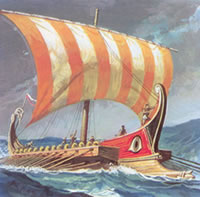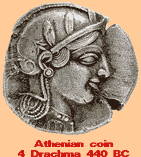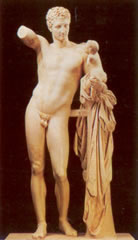 After these waves of destruction, the birth of the city state (or polis) occurred when, cut off from the outer world through loss of sea power, with regions isolated from each other by mountain barriers, the inhabitants were forced to rely on their own internal resources; cultivation of the soil became easier with the use of Iron tools.
After these waves of destruction, the birth of the city state (or polis) occurred when, cut off from the outer world through loss of sea power, with regions isolated from each other by mountain barriers, the inhabitants were forced to rely on their own internal resources; cultivation of the soil became easier with the use of Iron tools.
In time, sea faring and commerce resumed , though by around 750 BC, Greek society was divided into several hundred of city states which were like miniature, autonomous republics, Athens a very large city state due to its unification of all of Attica.

Still, the territory involved was not of a size much larger than an average English county, and numbered about 40,000 citizens in the 5th century BC, whereas most cities had at most 10,000. Plato asserted that half that number (5040 was the number he stated), was the ideal state; Artistotle envisioned a state in which all citizens knew one another personally.
It must not be forgotten, however, that women and slaves in these city states were disenfranchised, only free born males entitled to vote. The most important city states were Athens, Thebes, Corinth, Argos, Sparta, and Elis.
 City states were founded where there was an adequate water supply to support the population, access to arable land, and a position that was defensible.
City states were founded where there was an adequate water supply to support the population, access to arable land, and a position that was defensible.
In the beginning the defenses were built on the acropolis ( a summit within or on the edge of a city); later, entire cities were fortified, though the Spartans chose to depend on their military might, their city lying exposed on the Laconian plain. Athens and Thebes (Thiva in Greek) had had typical Mycenaean strongholds, though by the end of the 6th century BC, temples were built over the ruins of the Bronze Age palaces at Mycenae, Athens, Tiryns, and Knossos.
 Most of the city states chose an aristocratic form of government over the older monarchic form, with an ‘archon’ as head of state, though the inherited privileges of aristocrats led to seizure of power by ‘tyrants’ (the word having none of the negative connotation it carries in modern English), who were somewhat like revolutionary leaders.
Most of the city states chose an aristocratic form of government over the older monarchic form, with an ‘archon’ as head of state, though the inherited privileges of aristocrats led to seizure of power by ‘tyrants’ (the word having none of the negative connotation it carries in modern English), who were somewhat like revolutionary leaders.
Some of the unifying factors of the many diverse city states was the development of the Greek alphabet (based on the Phoenician one), major sanctuaries such as Delphi and Olympia, the verses attributed to Homer which imparted a sense of a shared history, the Olympic Games (participated in by all the city states).